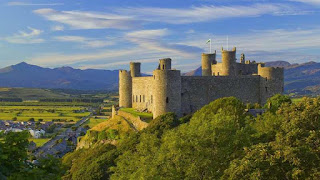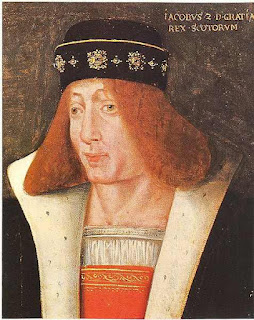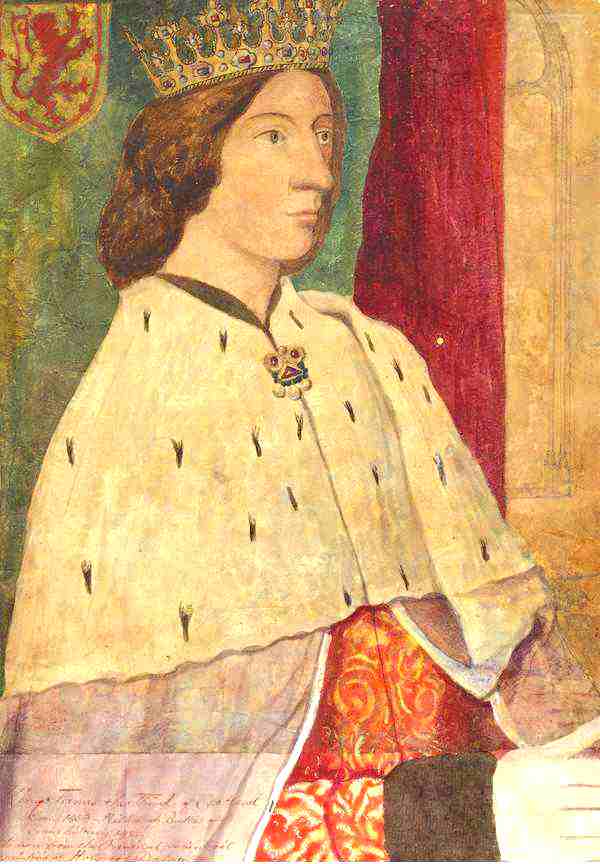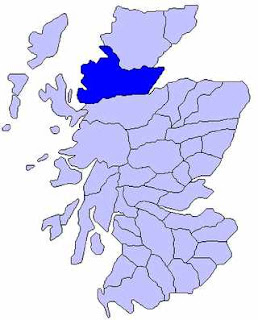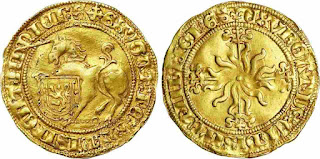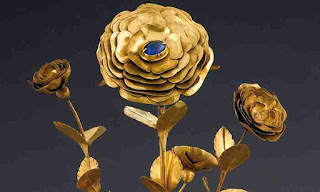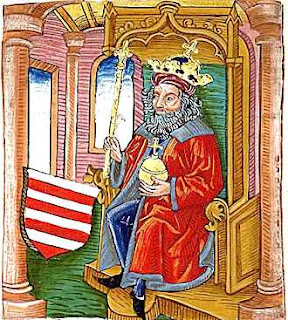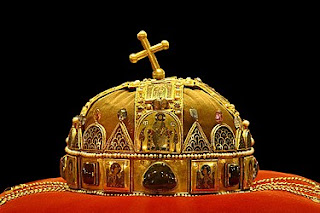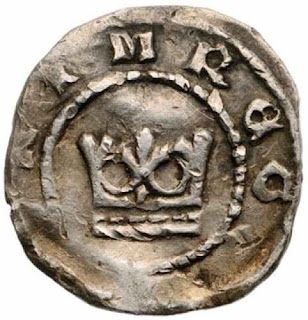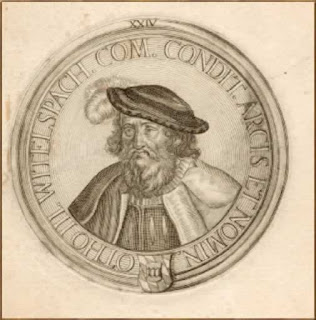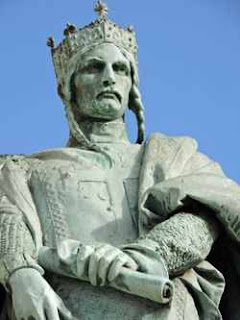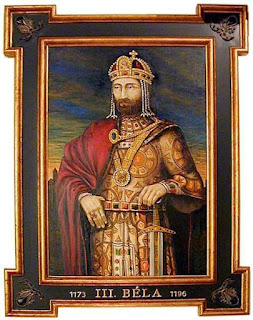Arranged Marriage, by King Charles VII of France.
A marriage set in stone: James was born in 1451 & Margaret in 1456. At less than five yrs of age, there was talk that she was set to marry James.After clarity of debts owned to Denmark were realized, Charles VII from the house of Valois, made his political suggestion for the two to marry.
The 13-yr old bride Margaret, became
the "Queen of the Scots".
the "Queen of the Scots".
Moving away from Denmark, the only daughter of Christian I and Agnes (Dorethea) Brandenburg, headed to Stirling castle, to rule her new kingdom, "Scotland". Which indirectly gained Orkney, Shetland, Hebrides, and the Isle of Man... all due to her non-paid dowry. The original dowry of 60,000 Florins, which also included that any former debts that Scotland owed Denmark were to be cleared. (long-held debts from James and other past Scottish Kings).
Not so fast though, while Margaret of Denmark was newly given 1/3 of all Scottish Kingdom income, for her side of the marriage deal. Her father Christian of Denmark did not pay the dowry, only 2,000. So, in essence James was stinted 58,000 Florins and ended up with islands instead. Perhaps very confusing to James, with both the Kings of France and Denmark pushing him to marry.
It was not a happy marriage, though, they lived perched up and away in their different castles.
Military styled Castles on steep cliffs, without extensive gardens.
Military styled Castles on steep cliffs, without extensive gardens.
He lived most of the time in Edinburgh Castle which overlooks the city, and she preferred her mountain-top view while raising her children to be at Stirling, high above the rest of the world in the countryside.
Somehow, as the years have passed on, generation to generation, we know that the married couple... apparently copulated only for propagation purposes. A lack-luster love pairing to say the least, a financial coup of Scottish Income for Margaret and a land claim for James.
Nothing to do with her beauty or attitude? Love lost? She wore very expensive haute couture to impress.
Perhaps one of them was "gay" or "frigid" or the business of being King was just filled with constant troubles.
James was only 9 years old when his father died, crowned "King of the Scats". Then he had another 8 yrs to acquire debt.
The marriage to Margaret was normally to be his financial trump card, and at the age of 17, he was to be "in the money" again.
Yet, It was just those missing Florins that probably nagged at him and her, the missing Rhenish florins.
Christian I to blame, turning her dowry into a near nothing, only the "No war state with Denmark" with the "keep-allow" of the outer islands.
All that the "impoverished" Denmark could do, was drop their Military push on those outer islands.
Possibly Denmark had planned to stop fighting over those islands and forfeit them anyway, plus Christian I, didn't have to pay the dowry.
James may have appeared like the new King on the block, to many people though, the islands making the country of Scotland its largest ever. They probably even had to change all of their maps, costing even more money.
Surely, England would have become very interested though, by the new Monster-Sized "Scotland".
Where to next? Would the Scots take England or Ireland? All plausible. It was a historical land grab, that provoked World interest.
Old Earl Macdonald & the Land of "Ross"
As the yrs past, James wanted his 2nd son to become the Earl of Ross. A good location, so James called Macdonald to "treason." However, his wife Margaret, Queen of the Scots, made the political decision, to allow Macdonald his freedom, his lands & continued status.A further thorn for their marriage. Why did she side with a stranger & forfeit her son's rights?
I can only presume, she liked to mingle with the social classes, and didn't want to make any waves against "the party group of nobles".
Plus, going into battle in the North was expensive, and possibly she was told by her father in Denmark, to "maintain the peace".
Yet, there was
"The Disfavor of James"
His action against Macdonald created an uproar & Margaret had to plea for the rights of James, for him to maintain his power of rule. All of which may have pushed her too far. The two became more estranged, and her religious self more pious. While his city was Edinburgh and her Castle was Stirling. "City & County" a marriage like a magazine title.James was not adored by Scottish nobles either, because he only chose certain favorites and gave them expensive gifts and land.
Those friends were called out as "wary characters". No mention of gambling debts, but normally wary friends go hand-in-hand with some sort of debt-owed. Chances are he was taken advantage of by them financially, from a very young age, as they "oogled" at his properties.
A mistake from James, was that he didn't make peace at home with the nobles, which eventually brought him to his death.
Sadness for the People, Due to Losing their Young Monarchs
The Young Queen died at age 30 from an illness, in her nested castle.Two yrs later James died at 36. Some say he was killed in battle, others say, he fell off his horse during battle, injured & taken into safety... only to be brutally stabbed to death by opposing rebels, the horrible rebels that were led by his own 15 yr old son.
The War Years Before James III was Killed
The years preceding James' death, were filled with political disruption and even battleships. He sided with England & then called to France for weapons, and all sorts of problems "Arose"...
The desperate nobles convinced his own son, "first-born James IV", to fight against his father, during the rebel battle, the very same battle that brought the King's death.
Elites from many other countries had also become involved,
but I'm not a "war story" verbatim-exact type of story-teller here.
but I'm not a "war story" verbatim-exact type of story-teller here.
Just a few facts, like he was imprisoned for a time, in his beloved Edinburgh Castle.
There was talk of his escape with bed sheets from high windows, after he either:
caused his guard to pass out from binge-drinking, or he actually killed his guard.
There was talk of his escape with bed sheets from high windows, after he either:
caused his guard to pass out from binge-drinking, or he actually killed his guard.
Therefore, it appears his last few years were troubled, with Armada-styled ships invading cities, castles burned,
and his first son becoming his enemy. Not a laissez-faire lifestyle at all, rather one that was very tumultuous, stressful & uneasy
The Golden Rose
Even the Pope sent James a rare rose, which became an "unlucky" gift, like it was "the kiss of death" from Rome. Thereafter, he was further attacked, imprisoned and killed, just 2 yrs later.
Why would the Pope be mingling in Scottish Politics?
England was pushing-in for Dominion land takes, and France was involved, Navarre and other high Counts from Spain were all dabbling into the foggy Scottish Highlands. All looking for land claims, available and easy.
England was pushing-in for Dominion land takes, and France was involved, Navarre and other high Counts from Spain were all dabbling into the foggy Scottish Highlands. All looking for land claims, available and easy.
A Broken Scotland
It looks as if, James hadn't created enough supporters to maintain the border rights. Had he gone with the Lairds and nobles and respected their dominions of "chateau keeping", he would have created a region of "stability". Scottish leadership had became divisive, so much so, that it practically wooed the International takers into war.
Conclusion to his Son James IV
At the age of 15, James IV became the next King of the Scots. However, he ruled under bevies of guilt due to his fathers murder. Being pushed into leading that opposing side.
War never left his past time though, ordering the build of approx. 38 ships, an Armada to protect Scotland. 25 yrs Later, his reign ended when he was killed in battle as well.








